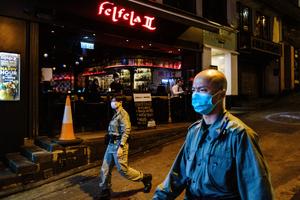 Riot police patrol the usually busy Lan Kwai Fong, a popular drinking area, in Hong Kong on March 23, 2020, after the citys Chief Executive announced plans to temporarily ban the sale of alcohol in bars and restaurants as a measure to help stop the spread of the COVID-19 caused by the novel coronavirus. PHOTO / AFP)
Riot police patrol the usually busy Lan Kwai Fong, a popular drinking area, in Hong Kong on March 23, 2020, after the citys Chief Executive announced plans to temporarily ban the sale of alcohol in bars and restaurants as a measure to help stop the spread of the COVID-19 caused by the novel coronavirus. PHOTO / AFP)
The normally packed streets of Hong Kong’s Lan Kwai Fong bar district were virtually empty on Monday night. So too was a popular Italian eatery in Wan Chai, a neighborhood known for some of the city’s best restaurants and nightlife. In the SoHo area frequented by expat bankers and lawyers, the crowds were unusually thin.
At an Italian restaurant in Wan Chai, the general manager said an alcohol ban could shrink his business to less than 10% of the level before protests kicked off last June
Hong Kong’s sprawling drinking and dining scene has long been a cornerstone of life in the financial hub, where apartments are so tiny that hosting friends at home is often unfeasible. But after nearly nine months of turmoil -- first caused by the soical unrest stemmeing from the extradition bill incident and now by the coronavirus outbreak -- concern is growing that thousands of bars, clubs and restaurants across the city will be forced to close as their losses mount.
READ MORE: HK reports 30 new infections, tally reaches 386
This week, Hong Kong Chief Executive Carrie Lam said the government was planning to temporarily ban bars and restaurants from selling alcohol in an attempt to dissuade residents from gathering in large groups.
On Tuesday, Singapore followed that move by announcing a shutdown of all bars, cinemas and religious services as of midnight on Thursday. While the UK also recently shut down eateries and pubs, Boris Johnson’s government has pledged to pay rent and 80% of staff salaries for the duration.
“Last summer there were 15,000 restaurants in Hong Kong, and I anticipate that by this summer there will be less than 10,000,” said Syed Asim Hussain, co-founder of hospitality group Black Sheep Restaurants, which operates Hong Kong eateries popular with expats, including two venues that have been temporarily closed in a building visited by an infected guest. “We and others are looking at three successive quarters of financial losses. So we squarely are between a rock and a hard place.”

Lam’s announcement followed a recent jump in the number of Hong Kong residents who’ve tested positive for the virus, several of whom had reportedly been out drinking in Lan Kwai Fong. Front-page photos of expats gathered at bars have featured prominently in local news outlets, alongside articles admonishing drinkers for potentially spreading the virus.
ALSO READ: Hong Kong expats point fingers over who's spreading coronavirus
Other major metro areas, including New York City and San Francisco, have effectively shut down restaurants and bars or limited establishments to takeout and delivery as the virus spreads globally. Italy, Spain and France have implemented blanket closures.
Some Hong Kong residents have questioned whether bars are truly the hot beds of transmission the government is making them out to be
At the Italian restaurant in Wan Chai, the general manager said an alcohol ban could shrink his business to less than 10% of the level before protests kicked off last June.
Restaurant and bar receipts in Hong Kong totaled about HK$26 billion (US$3.4 billion) in the fourth quarter of 2019, down 14% from a year earlier.
“I think we have a responsibility to encourage people to enact social distancing -- and since local media started pointing the finger at Lan Kwai Fong, customers aren’t coming anyway,” said Ravi Beryar, operations manager at Rula Live, a music and sports bar. “But my staff need to know how long it’ll be until we reopen, and my landlord needs to know.”
Allan Zeman, chairman of the Hong Kong real estate firm that developed the Lan Kwai Fong area, told Bloomberg TV that his company was appealing to Lam for government assistance for local bars and restaurants. As a landlord, he said, he could only help “up to a certain point.”
Some bar operators are hoping they can find ways to keep serving alcohol while complying with the government’s calls to promote social distancing
“You still have payments to banks, and repayments and other things,” Zeman said. “The operators themselves also need to be able to help themselves, but we’ll do whatever we can to tide us through this difficult period.
“The problem that my tenants have, and many of the operators have, is that if you can’t serve alcohol they’ll go out of business because they’re bars or clubs,” he said. “That’s the only thing they sell.”
Some bar operators are hoping they can find ways to keep serving alcohol while complying with the government’s calls to promote social distancing.
“We’re famous for mixed drinks and draft beer, but if we have to stop that, I hope we can sell bottled beers to customers to take home,” said Annie Lam, who runs The Beer Bay, a popular haunt for commuters transiting through Hong Kong’s central ferry pier.
Ronny Daswani, co-founder of carry-out craft beer shop Craftissimo in the trendy Sheung Wan neighborhood, said his store didn’t appear to be immediately included in the government’s ban and that he tentatively planned to remain open. But he added that Craftissimo sometimes attracts crowds outside, and that he was willing to shut down temporarily if it would help curb the outbreak.
“A ban would really impact Hong Kong Island,” Daswani said. “Alcohol was one of the only resorts in these hard times.


